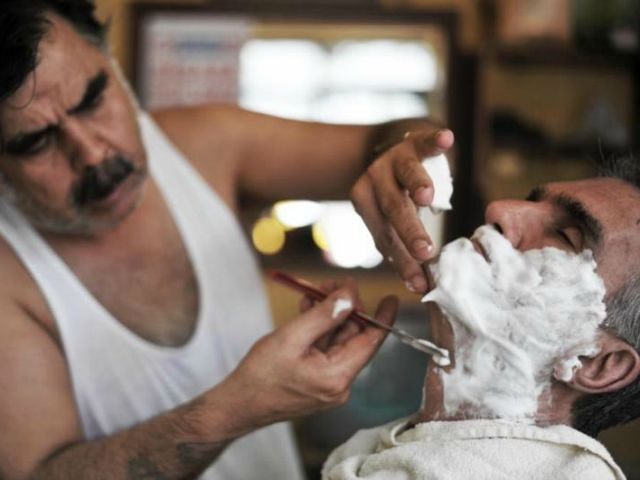As their nation continues its airstrike campaign against the Islamic State (ISIS/ISIL/IS)), Turkish barbers are seeing a spike in the number of men turning to them to maintain a clean-shaven look that keeps them from looking like members of the jihadist group. The new trend recalls another clean-shaven boom in 2014, when Kurdistan Workers’ Party (PKK) terrorists in the southeast targeted bearded men for attack.
“Nineteen ISIL members were detained in Manisa on Aug. 7 and had long beards, so people opted to get their own beards cut in order not to draw attention to themselves,” Manisa Chamber of Barbers and Hairdressers head Ali Batu explained to national newspaper Hurriyet. “In other words, ISIL has damaged the beard fashion but helped our business.”
Batu cited numerous anecdotes from those who work in his industry of experiencing a boom in the business, with many men telling their barbers that it is precisely to avoid looking like an ISIS terrorist that they have come to use their services. “I saw ISIL members everywhere in the news,” said one unnamed man, using the alternate acronym for the group. “I had grown my beard longer but now I’m getting it cut. I don’t want to look like a member of ISIL.”
Hurriyet implies in the piece that this clean-shaven boom appears to be a mostly moral stand against ISIS, not the result of any pressure to avoid danger by not attracting attention. Men simply want to avoid looking like the terrorists they see on their television on whom their government is supposed to have declared war. This situation is somewhat different from that of October 2014, when bearded men were in actual danger of attack from anti-ISIS groups, most notably the PKK, a Marxist terrorist group.
In 2014, Daily Sabah reported that numerous men had reported being physically attacked in southeast Turkey, particularly in the province of Diyarbakır, because they were sporting beards. PKK terrorists had begun to use the beard as shorthand for affiliation with the Islamic State and breaking men’s cars or physically beating them on the street. Sabah claimed barbers reported 15 customers a day who wanted to remove their beards to avoid being attacked.
The Turkish government is currently also involved in a war against the PKK, arguably more intensely than against ISIS. An estimated 400 PKK terrorists in Iraq have been killed, along with dozens of others in Syria. The number of people suspected of having ties to the PKK arrested within Turkey is rapidly nearing 1,000. A smaller number of “jihadis” (Islamic State and other Sunni radical groups) have been expelled from the country, rather than detained. The difference in intensity between Turkey’s fight against the PKK and that against ISIS has triggered skepticism that Turkey is committed to the fight against the Islamic State, particularly given the PKK’s animosity towards the terrorist group.
In areas where the Islamic State is in control, the beard situation has been the exact opposite of that in southeastern Turkey. ISIS imposed a ban on shaving in Mosul, with “beard patrols” monitoring civilians to ensure that they abide by the decree. Such a law would ensure that jihadis and conquered civilians would be indistinguishable in the event that the Iraqi army or Kurdish Peshmerga take the city back, likely resulting in a large number of civilian deaths.
The converse is true for those jihadis who have been defeated on the battlefield and wished to return to Turkey. In 2014, reports began surfacing that barbers were seeing a spike in clientele headed back to Turkey from Syria, shortly after the Kurdish YPG and YPJ defeated the Islamic State in the border town of Kobani. Some were defeated ISIS fighters. Others were members of other militias, hoping not to be absorbed into ISIS if they got caught. “Eighty percent of my clients are former fighters who are returning,” said one barber, Abdel Qader Mahzoud.

COMMENTS
Please let us know if you're having issues with commenting.